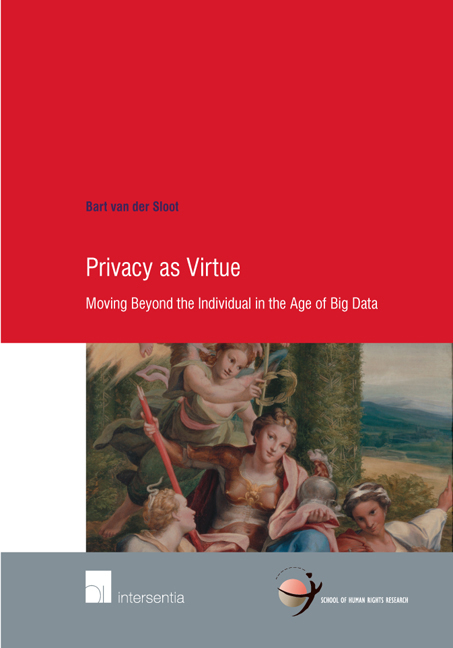Book contents
- Frontmatter
- Contents
- Chapter I Introduction
- Chapter II The Transformation of the Right to Privacy and the Right to Data Protection
- Chapter III The Challenges for and Alternatives to the Current Privacy Paradigm
- Chapter IV Developing an Alternative Privacy Paradigm through Virtue Ethics
- Chapter V Embedding a Virtue-based Approach in Privacy Regulation
- Chapter VI Conclusion
- Bibliography
- Miscellaneous Endmatter
Chapter IV - Developing an Alternative Privacy Paradigm through Virtue Ethics
Published online by Cambridge University Press: 12 October 2018
- Frontmatter
- Contents
- Chapter I Introduction
- Chapter II The Transformation of the Right to Privacy and the Right to Data Protection
- Chapter III The Challenges for and Alternatives to the Current Privacy Paradigm
- Chapter IV Developing an Alternative Privacy Paradigm through Virtue Ethics
- Chapter V Embedding a Virtue-based Approach in Privacy Regulation
- Chapter VI Conclusion
- Bibliography
- Miscellaneous Endmatter
Summary
INTRODUCTION
Chapter II showed that both the privacy and the data protection paradigm have transformed of the years. These doctrines are (1) increasingly seen as subjective rights of natural persons instead of duties (of care) for states and data controllers, (2) increasingly focused on individual instead of general interests, (3) increasingly balanced by courts against other interests instead of a necessity test being applied and (4) increasingly codified (in detail) and enforced through legal means. Chapter III showed that these four characteristics are put under pressure by developments known as Big Data and mass surveillance. In particular, it argued that most of the material provisions in the Data Protection Directive and the General Data Protection Regulation are undermined and that the almost exclusive focus on the individual (rights, interests and balancing) and legal regulation are difficult to maintain.
Chapter III also showed that in jurisprudence, in the law and in the literature, there is an increasing awareness of these tensions. The European Court of Human Rights has been willing to let go of its individualized interpretation of privacy in exceptional cases, the General Data Protection Regulation has introduced the concept of Data Protection Impact Assessments in the realm of data protection, and in the literature scholars have suggested a focus on group privacy, relational privacy and collective interests. The chapter concluded by suggesting that it might be worthwhile to take a closer look at agent-based theories. Those theories focus on the agent of an action, instead of the patient of an action (the one being acted upon). One such theory is virtue ethics. This chapter will discuss what virtue ethics entails and how it could be implemented in the legal realm. The next chapter will suggest what such an approach to privacy regulation might look like and how it could be implemented in practice.
This chapter endeavors to do two things. First, Section 2 will discuss the notion of virtue ethics. Second, Section 2 will analyze some of the most prominent arguments against adopting a virtue ethical approach to (privacy) regulation. It will consist of 3 subsections. First, it will provide the general contours of virtue ethics. Second, it will discuss in some further detail what a virtue ethical approach to the legal regime in general might entail. It will do so by analyzing the work of Lon L. Fuller.
- Type
- Chapter
- Information
- Privacy as VirtueMoving Beyond the Individual in the Age of Big Data, pp. 107 - 144Publisher: IntersentiaPrint publication year: 2017



